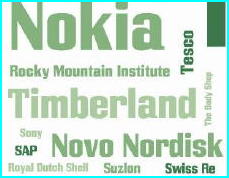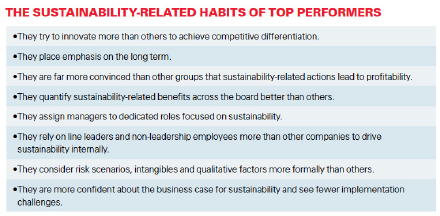What Do Timberland and Ford Have That You Don’t Have?

According to respondents to the second annual Sustainability & Innovation Global Executive Study — a collaboration between MIT Sloan Management Review and The Boston Consulting Group — top performers are significantly stronger “embracers” of sustainability-driven strategies.
Which came first? Does being a top performer give companies some kind of flexibility or mandate to think about sustainability? Or does thinking about (and acting on) sustainability issues help brand a company in the kinds of ways that help it become (or remain) a top performer today?
Take Timberland, the boot and outdoor clothing company. It’s a category leader, and it was named by many respondents to our survey as world-class at addressing sustainability (the illustration uptop is an excerpt of some of the names of companies cited). The company has a corporate social responsibility strategy and reporting manager, Beth Holzman. It reports on environmental and social performance on a quarterly basis and has since 2008. And it takes tangible, public actions that it works hard to let the world know about.
Hotzman, for instance, has blogged about the company’s commitment to plant 5 million trees in the next 5 years. “Our logo’s a tree and we’re an outdoor brand, so tree planting might seem like a natural connection for Timberland,” she wrote. “But we don’t just plant trees for the sake of doing so. . . We truly believe that tree planting can be a viable way to create sustainable agriculture, environmental restoration and socio-economic development, whether we’re planting trees in the Horqin Desert in China, the Marston Vale forest just north of London, or in rural communities.”
Is Timberland interested in sustainability because it sees that as part of its job as a visible, market leader? Or does its interest in sustainability enhance its reputation among its outsdoors-passionate customers and help keep it a top performer? Or is it a little of both? Here’s some of what we found in our survey:
At Ford Motor Company, another company named by survey respondents as world-class at addressing sustainability, John Viera, director of sustainability and environmental policies, acknowledged in an

